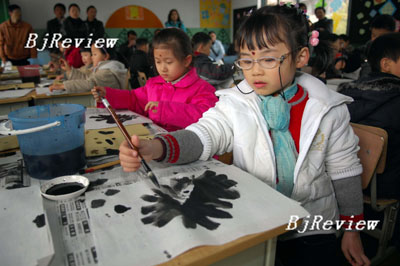
This year marks the 30th anniversary of the reestablishment of China's university entrance examination. The results have been a great increase in the number of professional and technical personnel. However, many problems remain in spite of the rapid growth in the economy.
The creative ability of Chinese children has been hindered by the stress placed on a test-oriented educational system. A student's ability is judged solely by the score of his exams. How well the student obeys his teachers and parents becomes the standard for appraising him.
However the excessive homework and submissive obedience to teachers and parents has worn down students' active imagination and creative spirit.
This problem has now shown up on the radar screen of the Chinese People's Political Consultative Conference (CPPCC), the country's top advisory body and the National People's Congress (NPC), China's top legislature.
CPPCC member Xie Zhongjie conducted an interview with a 10-year old Beijing girl.
He was amazed to find out how she spends her weekend. On Friday evening, this fourth-grade primary school student attends an Olympic mathematics class. After class she must write 15 math problems as extra homework.
On Saturday morning, she attends an English class in preparation for the second grade of the Public English Test System, a system to test the English level of Chinese students. If she passes the second-grade test, it means that her English level is equal to that of senior school students. During this class, she is asked to recite new words and expressions from seven English texts. In the afternoon, she has a writing class. In the evening, she practices the piano for two hours.
On Sunday morning, she has a piano lesson with the goal of passing the sixth grade test, a standard set by the China Musicians Association for amateur students. In the afternoon, she takes ballet lessons. In the evening, she must write two Chinese compositions.
NPC Deputy Xu Bingyin met a senior high school student who gets up before six o'clock and starts off to school at 6:30 everyday. He does not come home until 8 PM. After three hours of homework, he gets only five to six hours of sleep.
A survey taken among children in Shandong Province showed that 9 out of 10 students have myopia or short-sightedness.
A recent report from the Beijing Municipal Commission of Education indicated that the physical index of students has been in decline for the last 20 years. There has been a marked increase in the cases of nearsightedness and obesity.
"Chinese children are caught in a vicious circle; the test-oriented educational system is producing a series of problems," said Ma Chengguo, a deputy to the NPC. The present education system forces students to mechanically recite what they read which impedes their imagination and creative ability.
In recent years, the Ministry of Education has issued rules to ease the burden of study on students. "Although rules have been established to ensure middle school students get enough sleep, in fact, the results have been just the opposite," said Song Wenxin, a deputy to the NPC.
The reason is that an increasing number of students want to attend the university but China's universities only recruit students who have received the required score on the annual university entrance exam. As a result, the nine-year compulsory education system forces the students to pursue high marks which is the only way to ensure they enter a respected high school and, finally a reputable university.
Therefore, learning is a heavy burden. The students' weekends are filled with various classes. The pressure and stress from the school and parents are constant. "I always feel anxious in class and even want to vomit when doing homework," said Xiao Wang, a senior middle school student from Shantou. "My classmate sitting next to me is always listening to MP3 secretly, saying that she is afraid of the endless test and homework," she added.
Many people wonder what kind of education system is needed in China. Should it be a factory which mass produces robotic test-takers or a research lab that produces innovators, inventors, and creative professionals?
Liu Changming, head of top-ranked Beijing No. 4 Middle School, suggested that middle schools should not be ranked according to the proportion of students admitted to the university. By removing this pressure, the middle schools will be able to play a positive role in developing creative children.
CPPCC member Sun Jiye said learning should not be at the expense of children's health and imagination. He suggested setting up a comprehensive education system to better evaluate students and schools.
In an interview with Xinhua on March 9, Education Minister Zhou Ji said that the test-oriented education system has become a serious problem. Chinese children lack creativity and experience.
He vowed to promote education for well-rounded development by reforming both the senior high school and university entrance examination. He said that the system of personnel placement also needed reform. The aim is to set up a system that will discover creative personnel, relieve the burden on students, and stimulate students to develop happy normal lives.
Minister Zhou also called for students to consider taking the road of attending a sound secondary vocational school so that they could receive technical training and be able to get a good job while continuing their studies in the future. This would also relieve the pressure of large numbers of students sitting for the university entrance exams.
The public expects the reforms of the Chinese educational system to help develop children with imagination, creativity, curiosity, and playfulness which are not only essential to the child but to the society as a whole. | 